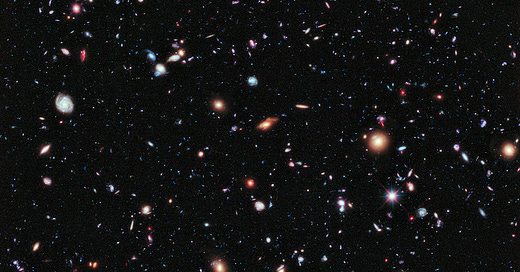As an astrophysicist, Martin Rees has contributed to our knowledge of the early universe, galaxy formation, dark matter, extreme cosmic phenomena, and the possibility of a multiverse.
“To survive, to avert what we have termed future shock, the individual must become infinitely more adaptable and capable than ever before. We must search out totally new ways to anchor ourselves.” These words that sound so contemporary are from the famed futurists Alvin and Heidi Toffler’s 1970 book Future Shock.
That was then and here we are in 2019. A recent United Nations report from the Intergovernmental Panel on Climate Change (IPCC) indicated that decisive action would be needed in the next twelve years to avert catastrophic climate change, even as we begin to confront some of the troubling implications of rapid developments in biotechnology, robotics, and artificial intelligence; for example, deployment of a global pandemic as an act of bioterrorism is increasingly technically feasible. A recent UN report from the Intergovernmental Science-Policy Platform on Biodiversity and Ecosystem Services (IPBES) calculated that species extinction has accelerated to an unprecedented rate, threatening ecosystems, livelihoods, and food supplies. Amidst diverse calls to action on these complex threats, what we sorely need is a steady and clear mind to help us locate guiding principles to mitigate and contain these existential risks. Martin Rees, an eminent cosmologist who has made significant contributions to our knowledge of the history of universe, does precisely this in his recent book, On the Future: The Prospects for Humanity.
On the Future examines the peril of nuclear confrontation, the threat of bioterrorism, the pressure that our unruly growth as a species places on supplies of food, water, and other vital resources, the potential misuse of cybertechnology, robotics, and artificial intelligence. He considers each of these threats systematically using risk analysis, weighing empirically the likelihood of different outcomes against the costs of mitigation. For instance, reviewing the threat from climate change, he arrives at these recommendations for collective action: improving energy efficiency; cutting methane, black carbon, and CFC (chlorofluorocarbon) emissions; and pursuing low-carbon energy sources, such as renewables, nuclear, and fusion technology.
Weighing comparative risk might well be the most effective strategy, as thus far denialism has hampered efforts to move forward on these dangers. The libertarian policy expert Jerry Taylor (former vice president of the Cato Institute) recently wrote in The Bulwark that analyzing climate change using the tools of risk management had convinced him of the urgency of action. Let us hope that On the Future brings more such shifts of perspective.

Rees debunks an option currently popular among the billionaire set, of establishing a human colony elsewhere in the solar system, on Mars for example. He makes a realistic assessment of our current technological limitations, like our inability to limit damage to biological material in space from ionizing radiation pretty much anywhere else in the solar system at the present time.
Like many current thinkers, however, Rees is optimistic about a post-human future, a future that would include, if not be comprised entirely of, a new hybrid species, part biological and part machine. He joins the philosopher Andrew Morton, who argues in his new book, Should We Colonize Other Planets?, that the death of the human race is ultimately inevitable and we should secure the continuity of our intellectual inheritance by passing our legacy to new intelligent machine-beings, free of the biological limits that hamper us. Rees and Morton are advocating for research in robotics and artificial intelligence to be leveraged in this direction.
Despite all the bad news, I found the concluding remarks of On the Future comforting: we are called upon to be technological optimists, as there is actually no scientific or technological impediment to creating a sustainable and secure world in the here and now. That Rees is a distinguished scientist with demonstrated powers of empirical analysis has equipped him to reach these conclusions in a convincing and persuasive way. All we need do is redirect our efforts toward more responsible and ethically-driven innovation.
Priyamvada Natarajan is a Professor in the Departments of Astronomy and Physics at Yale and the Sophie and Tycho Brahe Professor at the Dark Cosmology Center, Niels Bohr Institute, at the University of Copenhagen, Denmark. She is the author of Mapping the Heavens: The Radical Scientific Ideas That Reveal the Cosmos. She was a student of theoretical astrophysics with Martin Rees at the Institute of Astronomy, University of Cambridge, where she earned her PhD and was the first woman in Astrophysics to be elected a fellow of Trinity College.
Book Post is a by-subscription book review service, bringing book reviews by distinguished and engaging writers direct to your in-box. Thank you for your subscription! As a subscriber you can read our full archive at bookpostusa.com. Please help us spread the word about Book Post: your subscriptions keep us going, supporting writers and books and reading across America.
Coming soon: Emily Bernard on Lorraine Hansberry, Edward Mendelson on the history of typography.
The Raven Book Store in Lawrence, Kansas, is currently Book Post’s partner bookstore. We support independent bookselling by linking to independent booksellers and bringing you news of local book life as it happens in their aisles.
Follow us: Facebook, Twitter, Instagram
If you liked this piece, please share and tell the author with a “like”




❤️